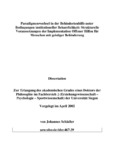Citation link:
https://nbn-resolving.org/urn:nbn:de:hbz:467-39Files in This Item:
| File | Description | Size | Format | |
|---|---|---|---|---|
| schaedler.pdf | 1.01 MB | Adobe PDF |  View/Open |
| Dokument Type: | Doctoral Thesis | metadata.dc.title: | Paradigmenwechsel in der Behindertenhilfe unter Bedingungen institioneller Beharrlichkeit: Strukturelle Voraussetzungen der Implementation Offener Hilfen für Menschen mit geistiger Behinderung | Authors: | Schädler, Johannes | Institute: | Fachbereich 2, Erziehungswissenschaft und Psychologie | Free keywords: | Heilpädagogik, Institutionenkritik, Offene Hilfen, NetOH | Dewey Decimal Classification: | 300 Sozialwissenschaften, Soziologie, Anthropologie | GHBS-Clases: | ORW | Issue Date: | 2002 | Publish Date: | 2005 | Abstract: | Der erste Teil der Arbeit versucht mit einem neo-institutionalistischen Erklärungsansatz die Gründe zu analysieren, warum die Praxis der Hilfen für geistig behinderte Menschen trotz langjähriger Reformdiskussion noch immer durch ‚stationäre Dominanz’ gekennzeichnet ist. Dazu werden die prägenden historischen Entwicklungspfade der Behindertenhilfe in Deutschland nachgezeichnet, die gleichzeitig Veränderungsoptionen restringieren. Im zweiten Teil werden empirische Untersuchungen zum Vergleich von stationären und gemeindenahen Hilfeformen für geistig behinderte Menschen ausgewertet. Bei der Betrachtung der Institutionenkritik wird deutlich, dass der traditionelle heilpädagogische Begriff der ‚Institution’ nur einen sehr beschränkten Erklärungsgehalt hat, da die äußere Form von Hilfen ihre gute Qualität nicht gleichsam ‚garantiert’. Auch ambulante Dienste brauchen bestimmte Regeln, um verlässliche und dauerhafte Hilfen zu sichern. Im dritten Teil der Arbeit werden Eckpunkte eines neuen heilpädagogischen Institutionenbegriffs formuliert, der Institutionen nicht mehr als materiell-soziale Gebilde begreift (Gebäude, Einrichtungen etc.), sondern als Regelwerke, die Rollenerwartungen standardisieren. Es wird dafür plädiert, für professionelle Dienste den Begriff der Organisationen zu verwenden, die durch professionelle Regeln (Institutionen) strukturiert werden. Im vierten Teil der Arbeit wird dargestellt, wie Regelwerke beschaffen sein sollten, die bei der Implementation Offener Hilfen zu berücksichtigen sind. Dabei werden die Leitprinzipien des ‚neuen Paradigmas (Selbstbestimmung, Bürgerrechte und Partizipation’) zugrunde gelegt und im Handlungsrahmen eines sozial-ökologischen Entwicklungsmodells entfaltet. Die Arbeit will einen Beitrag dazu leisten, den regionalen Planungsansatz ‚Netzwerke Offener Hilfen für Menschen mit Behinderungen (NetOH)’ des Zentrums für Planung und Evaluation Sozialer Dienste (ZPE, Universität Siegen) theoretisch zu fundieren. With a neo-institutional approach the first part of this study analyses reasons, why the current German support system for persons with intellectual disabilities is still dominated by ‘institutional practice’. Structuring historical developmental path are presented, that restrict options of reform. The second part evaluates empirical studies that compare effects of institutional and community types of care for persons with intellectual disability. One result is, that the traditional concept of ‘the institution’ as a category for care is of limited use for structural reform approaches. External characteristics of organisations do not per se ‘guarantee’ good quality of care. Also community services need certain sets of rules, to assure reliability and continuity of their support. The third part presents cornerstones for a new understanding of the term ‘intititution’ in the Heilpädagogik. Institutions are not conceived as material-social phenomenons (buildings, hospitals), but as sets of rules that standardise role-expectations. It is suggested, to use the term ‘organization’ for professional services, that are structured by professional sets of rules (institutions). The fourth part suggests characteristics of ‘institutions’ that have to be respected in the process of implementation of ‘Open Services’,a new type of services for persons with intellectual disability. They are based on the principles of the ‘new paradigm’ (self determination, civil rights,participation) and are worked out in the framework of an ecological approach for personal development. The disseration wants to contribute to the theoretical fundament of the regional planning approach ‘Networks of Open Services for Persons with Disabilities, NetOH’ of the the Centre for Planning and Evaluation of Social Services (ZPE) at the University of Siegen, Germany. |
URN: | urn:nbn:de:hbz:467-39 | URI: | https://dspace.ub.uni-siegen.de/handle/ubsi/853 | License: | https://dspace.ub.uni-siegen.de/static/license.txt |
| Appears in Collections: | Hochschulschriften |
This item is protected by original copyright |
Page view(s)
4,001
checked on Mar 10, 2025
Download(s)
12,363
checked on Mar 10, 2025
Google ScholarTM
Check
Items in DSpace are protected by copyright, with all rights reserved, unless otherwise indicated.

